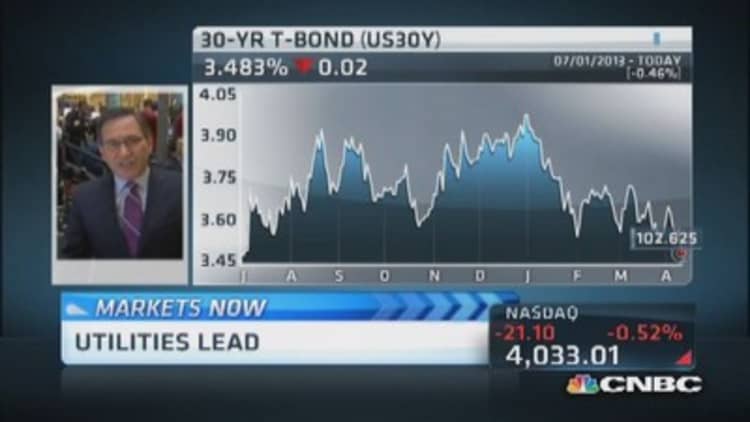Treasurys
U.S. Treasurys prices fell on Wednesday as rising stocks reduced demand for lower risk government bonds, and as Federal Reserve Chair Janet Yellen expressed optimism on the economy.
Better-then-expected growth in China, the world's largest economy, and a rally in Yahoo shares helped stocks rise for a third straight session. U.S. economic reports showed signs of overall strength. The data came as Yellen stressed that employment and inflation will be key to the still distant decision over when to raise interest rates.
"The main message continues to be that the Fed remains committed to providing a helping hand to the economic recovery, while becoming more confident in the ability of the recovery to finally achieve liftoff later this year," said Millan Mulraine, deputy chief economist at TD Securities in New York.
More Wall Street economists believe the U.S. central bank will raise interest rates in the first half of 2015, as evidence builds that the U.S. economy has regained some momentum lost during an unusually rough winter, a Reuters survey showed earlier this month.
and seven-year notes, which are the most sensitive to interest rate policy, were the worst performers after Yellen's comments.
Five-year notes were last down 5/32 in price to yield 1.65 percent, up from 1.62 percent late on Tuesday. Seven-year notes fell 5/32 in price to yield 2.21 percent, up from 2.18 percent.
Benchmark 10-year notes dropped 2/32 in price to yield 2.64 percent, down from 2.67 percent earlier on Wednesday.
The yields fell to one-and-a-half month lows of 2.60 percent on Tuesday, as concerns about escalating tension in Ukraine sparked safety buying and a weak New York manufacturing survey raised fears over the strength of the U.S. recovery.

Data on Wednesday was mixed, but was overall seen as more bullish than bearish for the economy. U.S. industrial production rose at a faster-than-expected clip in March, and groundbreaking for new homes increased, but remained well below the post-recession peak hit in November, signaling the drag the housing market is placing on the economy.
"Industrial production and capacity utilization were both stronger than expected, probably trumping the housing starts number, which was a little bit weaker," said Lou Brien, a market strategist at DRW Trading in Chicago.
The Fed also said that U.S. economic activity picked up in recent weeks as weather-related drag lifted in its Beige Book report of anecdotal information on business activity collected from contacts nationwide. Data on Thursday, including a Philadelphia manufacturing survey, will be watched for further signals on the state of the economy.
Demand for inflation-linked debt will also be tested on Thursday when the Treasury sells $18 billion in five-year Treasury inflation-protected securities, or TIPS. TIPS have been among the worst performing assets since the Fed last year indicated it would begin paring its bond purchase program, leading many to wonder what will spark inflation, which continues to run below Fed targets of 2 percent.
Yellen on Wednesday emphasized that she still views low inflation as due to temporary influences and believes that it is likely to gradually rise back to the 2 percent level.
Dallas Fed President Richard Fisher said on Wednesday that he is "not uncomfortable" with the current low level of U.S. inflation, and will not vote for or support any policy that drives it above the Fed's long-term 2-percent goal.
Atlanta Fed President Dennis Lockhart also spoke on Wednesday, saying the Fed should try to make its communications on the expected path of interest rates more consistent with its policy statements.
The Fed bought $1.02 billion in bonds due from 2036 to 2044 on Wednesday as part of its ongoing purchase program. The bond market will close early on Thursday and be closed all day on Friday for the Good Friday holiday.
—By Reuters

